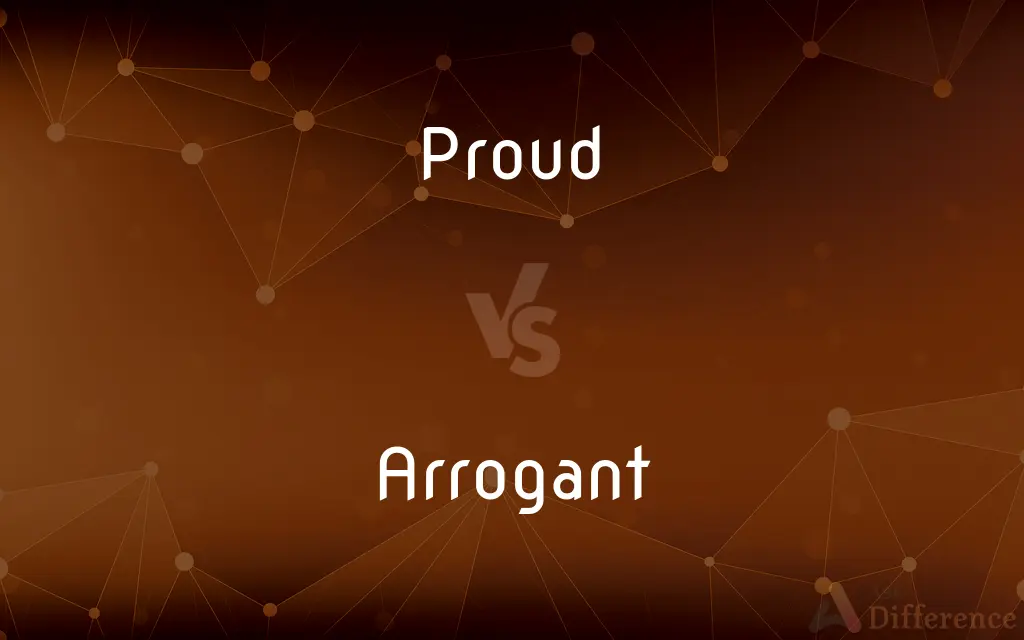Proud vs. Arrogant — What's the Difference?
By Tayyaba Rehman & Urooj Arif — Updated on April 24, 2024
Proud individuals take satisfaction in their achievements and virtues, whereas arrogant people exaggerate their importance, often demeaning others.

Difference Between Proud and Arrogant
Table of Contents
ADVERTISEMENT
Key Differences
Proud people feel a sense of accomplishment and self-respect about their achievements or qualities, while arrogant individuals often display an exaggerated sense of their abilities or importance.
Being proud typically involves a justified confidence that is rooted in real achievements or qualities, whereas arrogance is characterized by a pretentious and often unwarranted belief in one's superiority over others.
Pride is generally considered a positive emotion when it reflects genuine self-esteem and acknowledgement of one's efforts, on the other hand, arrogance is viewed negatively as it involves disrespect towards others and an inflated self-image.
While pride can foster self-worth and motivate individuals to achieve greater success, arrogance can alienate others and create a barrier to personal and professional relationships.
Proud individuals are likely to inspire others with their achievements and positive self-regard, whereas arrogant people may provoke resentment and disapproval due to their dismissive and superior attitude towards others.
ADVERTISEMENT
Comparison Chart
Basis of Feeling
Genuine achievements or virtues
Often exaggerated or unfounded
Impact on Self
Increases self-esteem
Inflates self-image
Perception by Others
Generally positive
Often negative
Social Effect
Can be inspiring
Often alienating
Attitude Towards Others
Respectful
Dismissive or demeaning
Compare with Definitions
Proud
Conscious of one's own dignity.
He was too proud to admit he was wrong.
Arrogant
Showing an offensive attitude of superiority.
She spoke arrogantly about her connections, ignoring others’ feelings.
Proud
Exhibiting a dignified sense of what is due to oneself or one's position or character.
He walked proudly after being promoted.
Arrogant
Having or revealing an exaggerated sense of one's own importance or abilities.
His arrogant tone made his coworkers resent him.
Proud
Feeling pleasure from one's own achievements.
She felt proud after receiving the award for her science project.
Arrogant
Assertive of unwarranted claims.
He arrogantly claimed he was the best, despite evidence to the contrary.
Proud
Having a high opinion of one's own dignity, importance, or merit.
They are proud to be the first in their family to graduate college.
Arrogant
Characterized by or proceeding from arrogance.
She dismissed their suggestions with an arrogant wave of the hand.
Proud
Manifesting pride.
She proudly displayed her artwork at the gallery.
Arrogant
Overbearingly assuming; insolently proud.
The manager's arrogant dismissal of feedback was criticized.
Proud
Feeling deep pleasure or satisfaction as a result of one's own achievements, qualities, or possessions or those of someone with whom one is closely associated
A proud grandma of three boys
She got nine passes and he was so proud of her
Arrogant
Having excessive pride in oneself, often with contempt or disrespect for others.
Proud
Having or showing a high or excessively high opinion of oneself or one's importance
He was a proud, arrogant man
Arrogant
Having or displaying excessive pride in oneself or an excessive sense of self-importance.
Proud
Slightly projecting from a surface
Balls standing proud of the fabric
Arrogant
Marked by or arising from a feeling or assumption of one's superiority over others
An arrogant contempt for the weak.
Proud
Feeling pleasurable satisfaction over an act, possession, quality, or relationship by which one measures one's stature or self-worth
Proud of one's child.
Proud to serve one's country.
Arrogant
Making, or having the disposition to make, exorbitant claims of rank or estimation; giving one's self an undue degree of importance; assuming; haughty; - applied to persons.
Arrogant Winchester, that haughty prelate.
Proud
Occasioning or being a reason for pride
A proud moment when she received her diploma.
Arrogant
Containing arrogance; marked with arrogance; proceeding from undue claims or self-importance; - applied to things; as, arrogant pretensions or behavior.
Proud
Feeling or showing justifiable self-respect
Too proud to beg.
Arrogant
Having or showing feelings of unwarranted importance out of overbearing pride;
An arrogant official
Arrogant claims
Chesty as a peacock
Proud
Filled with or showing excessive self-esteem
A proud and haughty aristocrat.
Proud
Of great dignity; honored
A proud name.
Proud
Majestic; magnificent
Proud alpine peaks.
Proud
Spirited. Used of an animal
Proud steeds.
Proud
Feeling honoured (by something); feeling happy or satisfied about an event or fact; gratified.
I am proud of Sivu’s schoolwork.
Proud
That makes one feel proud (of something one did)
That was not the proudest thing I did but I can’t deny it.
Proud
Possessed of a due sense of what one deserves or is worth.
I was too proud to apologise.
Proud
Having too high an opinion of oneself; arrogant, supercilious.
Proud
Generating a sense of pride; being a cause for pride.
It was a proud day when we finally won the championship.
Proud
(Of things) standing upwards as in the manner of a proud person; stately or majestic.
Proud
Standing out or raised; swollen.
After it had healed, the scar tissue stood proud of his flesh.
The weld was still a bit proud of the panel, so she ground it down flush.
Proud
(obsolete) Brave, valiant; gallant.
Proud
Feeling or manifesting pride, in a good or bad sense
Nor much expectA foe so proud will first the weaker seek.
O death, made proud with pure and princely beauty !
And shades impervious to the proud world's glare.
Proud
Having a feeling of high self-respect or self-esteem; exulting (in); elated; - often with of; as, proud of one's country.
Are we proud men proud of being proud ?
Proud
Giving reason or occasion for pride or self-gratulation; worthy of admiration; grand; splendid; magnificent; admirable; ostentatious.
Till tower, and dome, and bridge-way proudAre mantled with a golden cloud.
Proud
Feeling self-respect or pleasure in something by which you measure your self-worth; or being a reason for pride;
Proud parents
Proud of his accomplishments
A proud moment
Proud to serve his country
A proud name
Proud princes
Proud
Having or displaying great dignity or nobility;
A gallant pageant
Lofty ships
Majestic cities
Proud alpine peaks
Common Curiosities
What can cause a person to become arrogant?
Factors include insecurity, a need for dominance, or being consistently praised without constructive criticism.
What are some common signs of arrogance?
Common signs include dismissing others' opinions, always trying to dominate conversations, and behaving as if one is always right.
Can proud people be humble?
Yes, proud people can be humble; they appreciate their accomplishments without feeling superior to others.
Is it wrong to be proud of oneself?
No, it's healthy to feel proud of oneself for real accomplishments and positive traits, as it enhances self-esteem and motivation.
How can one maintain a sense of pride without becoming arrogant?
By acknowledging contributions from others, remaining open to feedback, and valuing humility alongside one's achievements.
How can parents prevent their children from becoming arrogant?
Parents can teach humility, emphasize the value of empathy, and ensure that praise is balanced with constructive feedback.
What is the role of culture in perceptions of pride and arrogance?
Cultural values and norms significantly shape how pride and arrogance are perceived; some cultures may value modesty more highly, viewing any display of pride as arrogance.
How does arrogance affect relationships?
Arrogance can damage relationships by causing resentment and distance due to perceived superiority and lack of empathy.
How does society typically view proud individuals?
Society generally views proud individuals positively when their pride is justified and not overbearing.
Can arrogance be a defense mechanism?
Yes, sometimes arrogance is used as a defense to cover up insecurities or vulnerabilities.
How can workplaces address arrogance effectively?
Workplaces can address arrogance through clear policies on respect and communication, regular training on teamwork and empathy, and by fostering an inclusive culture.
What are the consequences of unchecked arrogance?
Unchecked arrogance can lead to isolation, professional setbacks, and strained personal relationships.
Is arrogance ever beneficial?
While confidence can be beneficial, arrogance, which includes a lack of regard for others, is generally detrimental in most environments.
Are there professions where arrogance might be more common?
Professions with high stakes or where authority is emphasized, such as in surgery or high-level executive roles, might see more instances of arrogance.
Can arrogance affect one’s mental health?
Yes, arrogance can lead to issues like loneliness and lack of genuine connections, which can impact mental health.
Share Your Discovery

Previous Comparison
Company vs. Factory
Next Comparison
Setting vs. ContextAuthor Spotlight
Written by
Tayyaba RehmanTayyaba Rehman is a distinguished writer, currently serving as a primary contributor to askdifference.com. As a researcher in semantics and etymology, Tayyaba's passion for the complexity of languages and their distinctions has found a perfect home on the platform. Tayyaba delves into the intricacies of language, distinguishing between commonly confused words and phrases, thereby providing clarity for readers worldwide.
Co-written by
Urooj ArifUrooj is a skilled content writer at Ask Difference, known for her exceptional ability to simplify complex topics into engaging and informative content. With a passion for research and a flair for clear, concise writing, she consistently delivers articles that resonate with our diverse audience.
















































